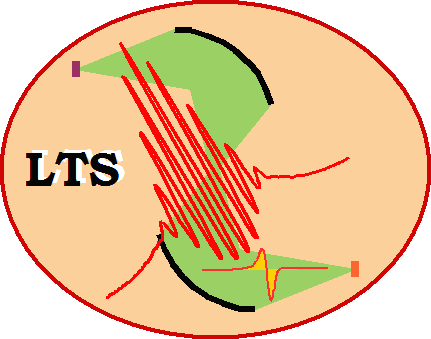
THz science and technology
Research
 Time-domain terahertz spectroscopy
Time-domain terahertz spectroscopy
As the main experimental tool in our research we use the time-domain terahertz spectroscopy. The qualifier “terahertz” denotes most commonly a range of frequencies from about 0.1 to 3 THz (wavelengths from 0.1 to 3 mm). This region has been explored intensively since about two decades, and the techniques could be developed mainly thanks to the availability of ultrafast lasers, which are able to produce optical pulses substantially shorter than 1 ps.
 Ultrafast dynamics
Ultrafast dynamics
The use of laser pulses for generation and detection of terahertz pulses makes it possible to synchronize optical excitation of a sample with a subsequent THz probing. This method is usually called time-resolved THz spectroscopy or optical pump — THz probe technique and yields information on the ultrafast dynamics in the far-infrared at sub-picosecond to nanosecond time scales. The scope of our interests here involves carrier dynamics in ultrafast and disordered semiconductors, carrier transport at metal surfaces and in phase change materials, and the conductive response of the nascent plasma.
 Ferroelectric and multiferroic materials
Ferroelectric and multiferroic materials
For many solids, terahertz spectral range contains precious information about the behaviour of low-frequency (soft) polar phonons and relaxational mechanisms (central modes) which are often responsible for structural phase transitions. We apply time-domain terahertz spectroscopy to investigate ferroelectrics and related materials.
 Photnoic structures: metamaterials and photonic crystals
Photnoic structures: metamaterials and photonic crystals
Design of photonic structures allows tailoring a large variety of specific optical properties. For example, photonic crystals with defects can act as very narrow-band-pass filters. The design of specific optical properties by photonic crystals is a promising mean to taylor functional elements for the THz spectral range. In our research we aim the conception of tunable or switchable photonic structures (by using suitable materials allowing their control by electric field or illumination).
 Terahertz microscopy
Terahertz microscopy
Time-domain terahertz spectroscopy is also often used for object imaging. The spatial resolution is determined by the radiation wavelength, therefore it encounters a severe limit in the terahertz spectral region. For this reason, near-field approaches are adopted. We have developed a terahertz microscope based on a near-field antenna.
 Medical application
Medical application
The potential of applications of terahertz spectroscopy extends to various domains, including medical application. We have conducted a study aiming at its possible use in conjunction with haemodialysis.

